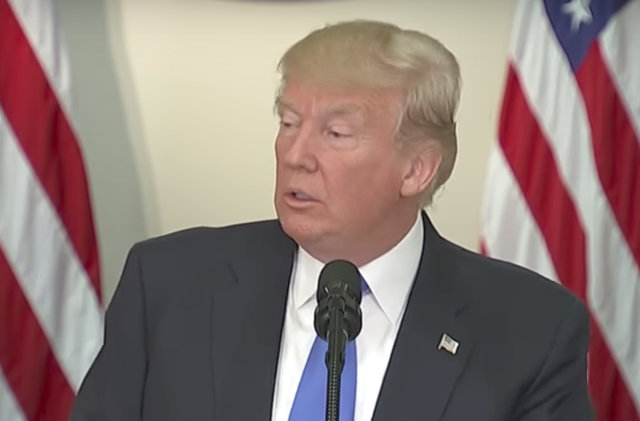 President Donald Trump‘s weekend tweet saying that he fired Michael Flynn in part due to Flynn’s lies to the FBI appeared to provide evidence that he may have committed obstruction of justice. Trump claiming that he fired Flynn because he lied to the FBI implies that he knew Flynn lied to the FBI at that point in time. This is problematic, because Trump allegedly asked James Comey to drop the Flynn investigation (Trump denies this), and then later fired him when he didn’t oblige. Trump’s alleged conversation with Comey took place after Flynn was fired, so the knowledge of Flynn’s crime supports the argument that Trump was trying to cover it up. John Dowd, Trump’s personal lawyer, has since claimed that the tweet came from him, perhaps in order to take some heat off of the President.
President Donald Trump‘s weekend tweet saying that he fired Michael Flynn in part due to Flynn’s lies to the FBI appeared to provide evidence that he may have committed obstruction of justice. Trump claiming that he fired Flynn because he lied to the FBI implies that he knew Flynn lied to the FBI at that point in time. This is problematic, because Trump allegedly asked James Comey to drop the Flynn investigation (Trump denies this), and then later fired him when he didn’t oblige. Trump’s alleged conversation with Comey took place after Flynn was fired, so the knowledge of Flynn’s crime supports the argument that Trump was trying to cover it up. John Dowd, Trump’s personal lawyer, has since claimed that the tweet came from him, perhaps in order to take some heat off of the President.
I had to fire General Flynn because he lied to the Vice President and the FBI. He has pled guilty to those lies. It is a shame because his actions during the transition were lawful. There was nothing to hide!
— Donald J. Trump (@realDonaldTrump) December 2, 2017
Dowd drew criticism after he claimed that he drafted the tweet. Former White House ethics lawyer Richard Painter said that Dowd should be disbarred for incriminating his own client.
Walter Shaub, former Director of the U.S. Office of Government Ethics , doubted that Dowd truly wrote the tweet, noting the phrasing, which said “pled” instead of the correct term, “pleaded.”
I dare you to tell Mueller you logged into POTUS’s Twitter account and wrote “pled” and the rest of that, John Dowd. I dare you. https://t.co/gDBnISywGS
— Walter Shaub (@waltshaub) December 3, 2017
Shaub later said that Dowd’s reason for posting the tweet makes no sense, prompting him to ask, “Why would you write the tweet then, Dowd? Or did you?”
Dowd’s explanation to CNN makes no sense. He claims he wrote the tweet claiming Flynn was fired partly for lying to the FBI, but he also rejects the idea that POTUS knew Flynn had lied. Why would you write the tweet then, Dowd? Or did you?
(@NatashaBertrand makes a similar point) pic.twitter.com/3hfU1Nllls— Walter Shaub (@waltshaub) December 3, 2017
It’s a fair question, but my guess is that Dowd was lobbing a Hail Mary to save his client. While it may not make a ton of sense, and certainly doesn’t make Dowd look good, there could be a method to the madness.
Imagine you’re Trump’s lawyer, and you log onto Twitter to see that your client volunteered a key piece of evidence in a developing case against himself. What do you do? Well, you think of a way to make sure that it can’t be used against him. Out of court statements are generally not admissible as evidence when used for the truth of their contents due to hearsay rules. Confessions and other statements from a defendant that go against their own interest are allowed as exceptions, because it’s assumed that a person wouldn’t lie in order to incriminate themselves. Trump’s tweet seems to fit the bill, so how do keep it out?
You say that someone else said it.
One might think that it would be better to pin the tweet on a staff member, but then Robert Mueller would try to get a name, and then he’d eventually find out that it didn’t come from them. Trump’s lawyer, on the other hand, could claim attorney-client privilege to keep from answering questions about the tweet.
If that sounds like a brilliant plan, don’t get too impressed just yet. Even I’m right about this, it probably wouldn’t work.
See, attorney-client privilege only covers information discussed between an attorney and a client that are not revealed to third parties. By claiming that he wrote the tweet, that information is no longer privileged. That means that Mueller’s office could ask Dowd under oath if he wrote it, and he wouldn’t be able to use privilege to keep from answering. He may still be able to avoid questions regarding why he did or did not write the tweet, but he’d risk perjury charges if he said under oath that he wrote it, if he in fact did not.
Not only that, but if prosecutors don’t believe that Dowd wrote the tweet, they could hold a hearing to try to get the tweet in as evidence against Trump. They would have to provide evidence that supports that belief (e.g. using “pled” instead of “pleaded,” the lack of any imaginable reason for why Dowd would tweet such a thing, as well as possible Twitter or phone records that may show whether or not Dowd was in the same location as the device that sent the tweet.
So why use such a strategy, if there’s a good chance it won’t work? Well, under the circumstances, I probably wouldn’t come up with anything better.
Ronn Blitzer is the Senior Editor of Law&Crime and a former New York City prosecutor. Follow him on Twitter @RonnBlitzer.
This is an opinion piece. The views expressed in this article are those of just the author.